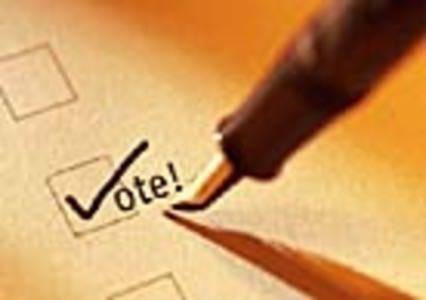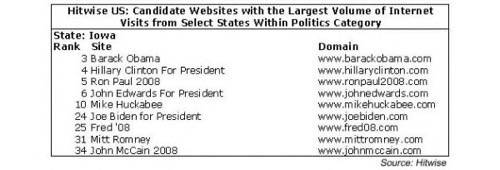The use of social networking and web-based organizing tools in politics has been a major story over the past year (in fact, we named it as our 6th most important story of 2007). Tonight, when a number of Iowans gather to decide who they think should represent the two major US political parties in the upcoming presidential election, we will begin to see if all that web campaigning paid off.

In August, we wondered if the the Internet really made a difference in election politics. Beyond the obvious ability to generate donations (as evidenced by the record funding numbers reported by Ron Paul last month), there are serious doubts as to whether Internet popularity can translate to success at the polls.
We noted in August, that looking at YouTube, MySpace, and Facebook popularity predicted an eventual head-to-head between Ron Paul and Barack Obama. But in every national poll at the time, neither candidate came out on top. In November, the Compete “Candidate FaceTime” metric showed Paul and Mike Huckabee way out in front, with Obama and Hillary Clinton leading on the Democratic side. The national poll results still don’t bear out the online popularity. National polls still have Clinton way ahead of Obama, and Paul in a distant sixth place.
We’ve speculated that one reason might be that much of the attention anti-war candidates like Obama and Paul are receiving is coming from overseas — where anti-war and anti-Bush sentiment is generally greater than in the US. American politics are profoundly important across the globe, so people outside of the US pay attention, but though their votes in online straw polls and visits to candidate MySpace pages are counted, they cannot vote in US elections and are left out of local polling.
Yesterday, Hitwise released numbers showing which candidate’s official web site was most popular among Iowans. That means these numbers can’t be influenced by people from other countries — this is the Internet election as predicted by the very people who caucus to start the process tonight.

Surprisingly, Iowa predicts wins for Barack Obama and Ron Paul — both of whom received far more Internet visits from Iowa connected computers in the past month than their next closes rivals (Clinton and Huckabee, respectively). Hitwise is seeing similar results nationally (though with Paul and Huckabee ahead of Obama and Clinton). These results are in line with what the web has been telling us all year.
The latest polls out of Iowa, however, still disagree with what the web predicts. Real Clear Politics, which averages major polls to come up with a single number, shows a statistical dead heat in Iowa between Obama, Clinton, and John Edwards. On the Republican site, Huckabee and Mitt Romney are neck and neck, but Paul is sitting in 6th place, well out of contention.
So which is right? While Obama and Paul continue to rack up the wins online, the offline poll numbers show a tougher road to the White House for both. At this point, it’s probably best to dispense with the predictions, and guesses, and analysis and wait to see who actually wins in the morning — then we’ll have a clearer picture of how much the Internet matters in campaign politics. At least until Tuesday, when we get to do it all over again in New Hampshire (where, incidentally, Hitwise shows John McCain and Mike Huckabee both leading Ron Paul, and the latest polls have McCain in the lead).
Image via: AAAS.

















